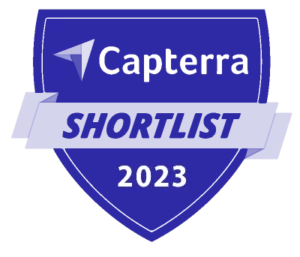Most vacation rental owners and managers get their companies started by listing properties on portals such as Airbnb and HomeAway/VRBO. It makes sense from a marketing perspective: these platforms are high-value, low-risk propositions. They reach millions of potential guests each month. Plus, the high-polish look converts visitors into guests. As for risk, you don’t pay marketing fees until your property generates a booking. Win-win right?
Unfortunately, an increasing number of owners and managers are completely dependent on vacation rental listing sites for their bookings, even after getting established in their markets. So what’s the problem with that? Didn’t we just say it was a win-win situation? The old expression of putting all your eggs in one basket comes to mind. If something happens with that listing site, there goes your income stream.
Here, we’ll look at the downsides of over-relying on vacation rental portals, but most importantly, what you can do to become independent from them.
The downsides of vacation rental listing sites
First, let’s take a step back and look at what a vacation rental listing site really is. Strip away the media, the marketing, the branding, and the fancy tech. In the end, you’re left with a corporation. And corporations act in the best interests of their shareholders, not necessarily yours. Taking that perspective, here are some of the downsides of vacation rental listing sites:
- Referral fees: No surprise here. They provide a service, and you pay for it.
- No chances to generate repeat business: If the guest had a 1-star experience, the site wouldn’t get a referral fee if they’d re-promote that property and the guest doesn’t book. So instead, they focus their energy on getting the guest back on the platform, not to specific properties.
- A giant corporation’s small decision can be devastating for a small company: The best example of this concept materialized during the COVID-19 pandemic. In an effort to protect their brand and long-term reputations, the major players announced they would allow no-fee cancelations for guests. Cancelations soared. Great for the sites and the guests, but that action wiped out entire months’ of revenue for thousands of hosts.
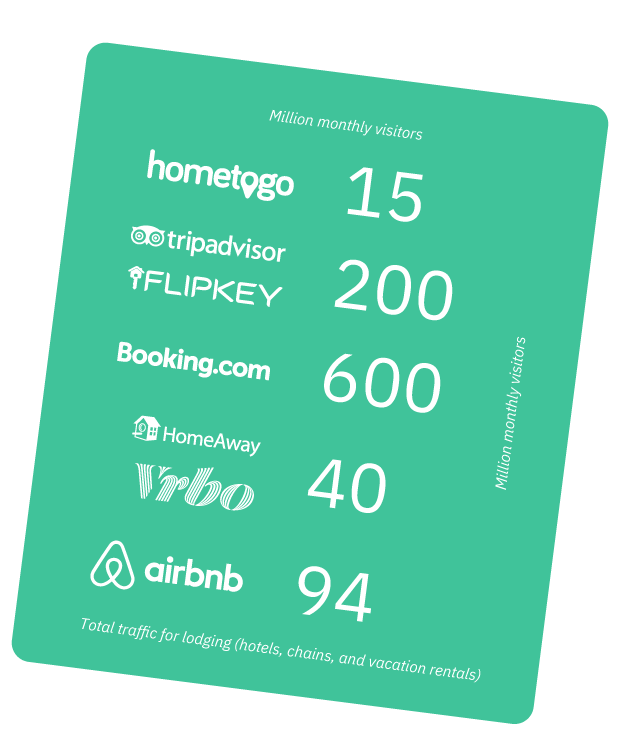 Despite some downsides, vacation rental sites are still worth it
Despite some downsides, vacation rental sites are still worth it
Before moving on, it’s important we clarify that vacation rental sites aren’t the giant heartless corporations—quite the contrary. Airbnb, Vrbo, and others created and then expanded an industry that we’re all benefiting from today. They’re also on the frontlines when it comes to changing local and state politician’s misconceptions that vacation rentals make housing unaffordable. On top of that, the sheer volume of potential guests they attract is undeniable.
So despite striving to become independent from these sites, any expanding vacation rental company will still need them to generate a portion of their revenue with listing sites. Our goal is to achieve independence by diversifying and taking control of marketing your vacation rental business yourself.
Independence through multi-channel distribution
The most successful property owners maximize revenue and decrease vacancies by becoming independent from one or two major vacation rental listing portals. They do this via multi-channel distribution which has two main components:
- Expansion of their presence on as many listing sites as possible
- Creation of a direct booking website to attract independent bookings
Direct booking sites also provide owners and managers with two added benefits. Assuming the company provides guests a superior experience, these guests are likely to:
- Return for future vacations (repeat bookings)
- Tell their friends and families about the property (referral bookings)
What’s great with direct, repeat, and referral bookings is that the vacation rental owners or managers don’t pay commissions to any third party. Now to be fair, there are costs associated with creating, maintaining, and marketing a direct booking site. In the end, the commissions saved may not be pure profits in your pocket. However, consider that with a direct booking site, you’ve lessened your dependency on vacation rental listing sites. If all of a sudden, one of those tech giants goes down or makes a decision that threatens your livelihood, a portion of your income stream is still safe.
The strategic move toward independence was conceptualized by VRMB founder Matt Landau in his famous Listing Site Independence (LSI) graph:
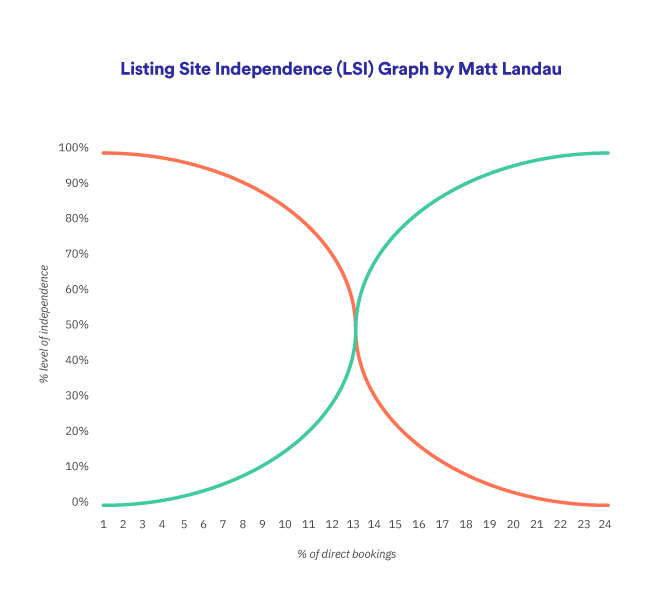
As illustrated above, even a highly-independent vacation rental company (80% and above) may still rely on listing sites to keep vacancies low. The truth is, listing sites have loyal customers. They like the branding, the user experience, and the online safety of dealing with a large company like Airbnb or Vrbo. These same guests may not think of searching for standalone vacation rental websites for accommodations. So despite your hardest efforts to become independent, you’ll still need to be on the listing sites to attract certain types of vacation rental guests.
What your peers are doing when it comes to LSI
When it comes to LSI, different vacation rental companies go about it in different ways. Some focus on expanding the channels their properties are listed on, while others create their own booking platform (direct booking site supported by marketing efforts). The key takeaway is that both tactics diversify their booking sources so that they aren’t reliant on one or two listing sites.
Listing on multiple vacation rental sites
When it comes to advertising on vacation rental sites, your peers branch out to more distribution channels as their property portfolio expands. It’s no surprise. Managing properties at scale requires automation through tech solutions (like the Hostfully Property Management Platform). However, there’s also the concept of time management. The diligence involved in acquiring properties to the portfolio takes time and energy. But adding listings on more sites takes just a few clicks. So by taking advantage of technology, your peers expand their marketing efforts at scale without spending more on it. We can see this concept in action with what Hostfully clients are doing with their distribution efforts:
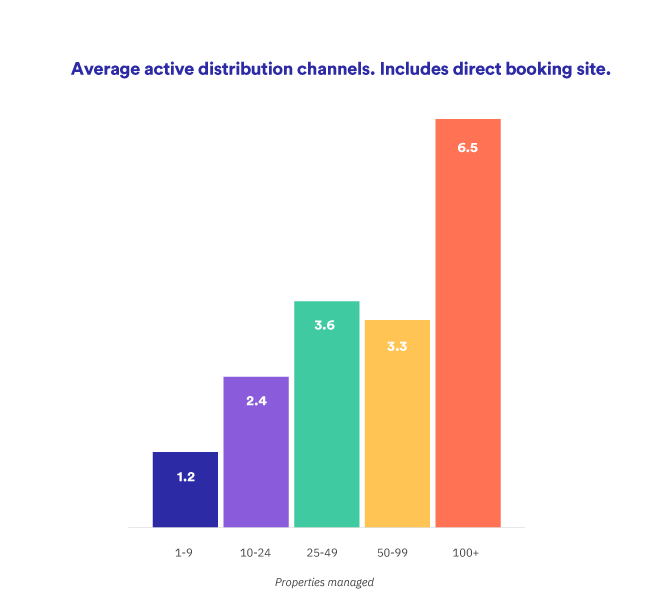
Direct booking sites
The other LSI tactic used by our clients is the creation of a direct booking site. As we can see, this method is really popular with large vacation rental companies (10 properties and over) and less so with small ones (10 or less):
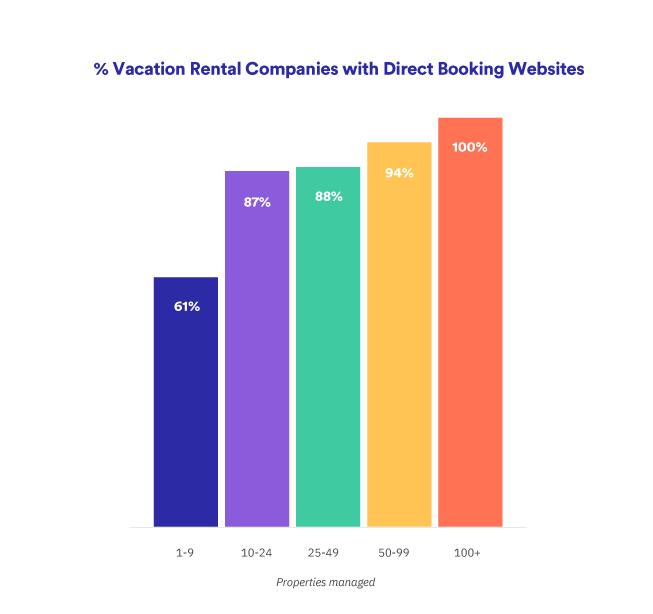
It shouldn’t be that way. Vacation rental companies of all sizes should invest the time and energy to create their own website. While building a website appears daunting at first, bear in mind that out-of-the-box solutions exist for vacation rentals. For example, one of the features of the Hostfully Property Management Platform is a pre-coded calendar and reservations widget that can be inserted on any webpage. So all you have to do is prepare a webpage, and our code takes care of the booking process.
Is a direct booking site worth it?
The building, maintaining, and marketing of a direct booking site isn’t free. Whether that spend is worth it is a valid question. However, sometimes a chart is worth a thousand words:
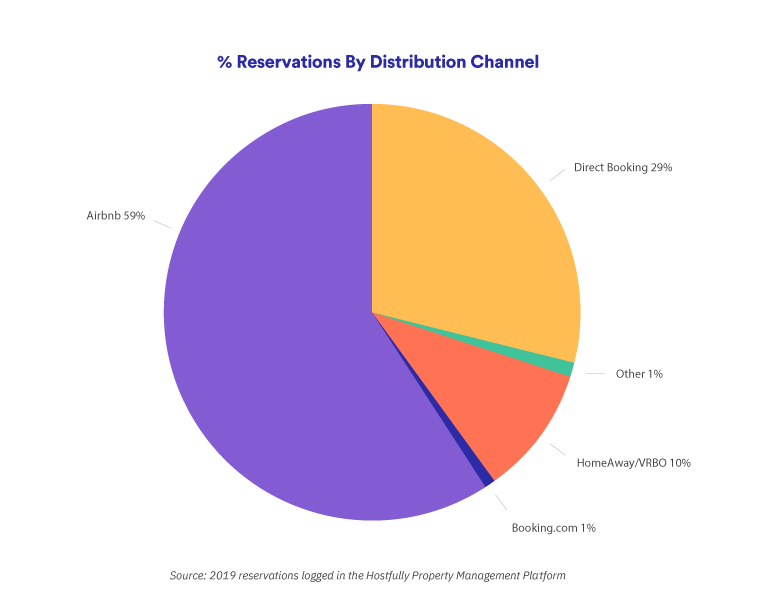
Across our clients spread around the world, in 2019 close to 30% of all bookings came from direct booking websites. Oddly enough, there wasn’t much variation in the percentage of bookings based on the size of the vacation rental company. That said, there were some outliers in niche markets that managed to secure close to 90% of their bookings independently.
Now imagine the long term benefits of generating one-third of your bookings yourself. Sure, you spent time and resources on the website. So the first year guests book directly with you, there was a cost associated with acquiring those customers. But after that, referral and repeat bookings are practically free. Just send quarterly emails offers loyal guests will want to take advantage of. Now consider this. The cycle of direct bookings generating repeat business compounds year after year.
Five steps to achieve independence
We looked at the benefits of diversifying your bookings acquisition strategy as a concept. But what does it look like in practice? Here are the five steps most vacation rental companies take to achieve LSI. Note that this a multi-year process that requires fine-tuning along the way.
1. The launch phase – get your vacation rental listings up and running
Focus on providing the best information to your guests to help them make a decision to book your properties. Prepare your vacation rental listing for your website first. It’s where you have the most creative freedom. The listings can then be copy/pasted on the vacation rental listing sites when you create accounts. We recommend the following:
- At least 20 professional, high-resolution photos. We recommend hiring a professional (especially if you’re photographically-challenge like some of us).
- At least 400 words of descriptive, creative content. Make people imagine how amazing it would be to stay at your home.
- Create accounts on all the major platforms and list your properties. This is mostly a copy/paste process.
- Respond quickly to any guest inquiries. This helps you get your first bookings. But most importantly, a quick response time is one of the metrics vacation rental listing sites use to rank you first in guest searches.
- Spend energy getting 5-star reviews for your properties ASAP! Even consider lowering your price just to get bookings which then leads to a large pool of reviews.
2. The branding phase – define your identity and unique features
This second phase is about introspecting a bit and finding what makes your property portfolio attractive and unique. You’ll build your direct booking site around that identity, so take your time. A few creative ways to find your business identity are:
- Reading guest reviews from vacation rental listing sites. Guests will comment on what they liked about the property.
- Research equivalent vacation rental companies from another state and see what they’re doing for branding and marketing.
- Invite friends and family over for a stay during the off-season or to plug a vacancy.
3. The building phase – get that website up and running
Now that you’ve got listing descriptions, pictures, and branding to focus on, it’s time to put it all together by building a website. When it comes to vacation rental direct booking sites, you have two options:
- DIYing: beginner-friendly drag-and-drop builders like Wix and SquareSpace make it easier than ever to create a polished website.
- Outsourcing: if you have the budget, hiring a contractor to build a custom site will save you time and energy. If you go this route, make sure the builder leaves you documentation on how to add properties or change pictures/text. Over the years, you’ll likely be adding properties to the portfolio or experiment with different marketing strategies. You don’t want to always go back to the builder for slight tweaks.
4. The outreach phase – let people know who you are and where to find you
The vacation rental listing platforms have their own web traffic to the listings on their sites. But when it comes to your direct booking site, you’ll have to generate your own traffic. That’s downside and cost to LSI. Luckily, generating traffic to your direct booking site isn’t as complicated as you may think. There are two tactics you’ll need to focus on:
- Social media: using social media for vacation rental marketing doesn’t have to be complicated to be efficient. Focus on Instagram first. It’s a perfect platform for the vacation rental industry since it’s visual. If you have the photos, just post a few regularly. Look at what your local competition is using for hashtags and emulate their tactic. As for creative pictures, get your photographer to take some for social media when he or she is already on-site for the listing pictures. You’ll pay a bit more for your photo package, but at least that’s one less thing to worry about.
- Search engine optimization (SEO): it’ll take a few months for your site to generate traffic. The search engines need to find it and figure out what it is. To accelerate the process, you can use what’s called SEO. If you google the term ‘SEO,’ you’ll find a lot of blog posts, how-to guides, and consultancy packages. The truth is, unless you’re in a competitive market or after a few months can’t generate traffic, don’t spend your hard-earned money on SEO services. Rather, focus on the SEO fundamentals, which are:
- Using the term ‘[city/area] vacation rental’ in at least one Header on each page
- Including the same term in the regular text as often as possible without compromising the readability.
5. The streamlining and automation phase – make it easy for you and your guests!
Now that your properties are on all the major vacation rental distribution channels and you’re getting traffic to your direct booking site, it’s time to relax, right? Not so fast. With all those active listings across so many channels, bookings will start rolling in. You’ll quickly be left with an administrative challenge. Without the right tools, here’s what you’ll have to do when a booking takes place:
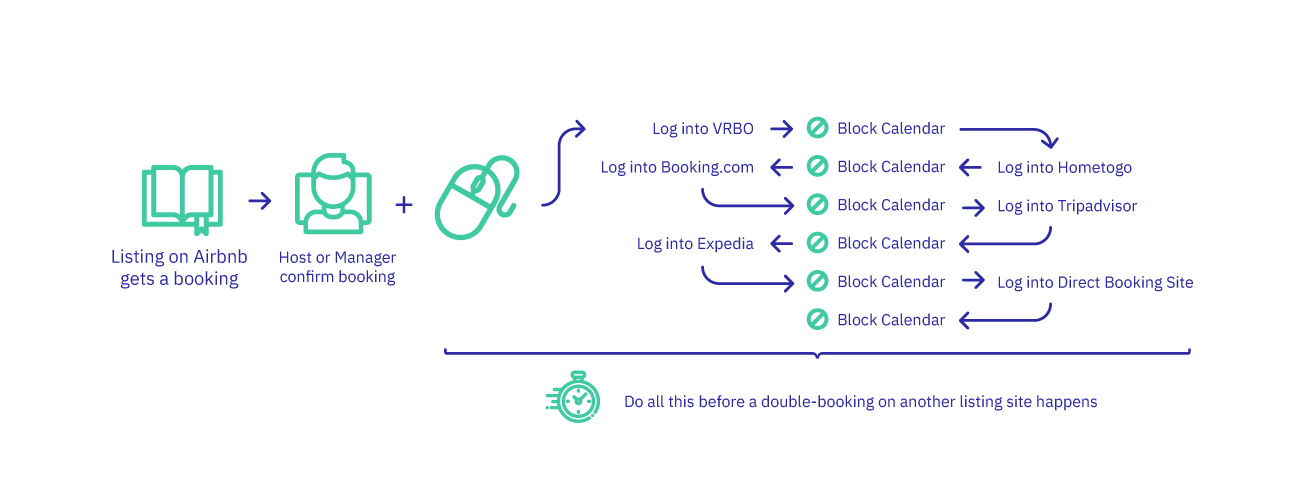
That flowchart gives us nightmares, yet it’s a reality many vacation rental owners face. Fortunately, a Property Management Platform (PMP) like Hostfully automates tasks like this. Just import your listings, and the PMP handles the calendar for you:
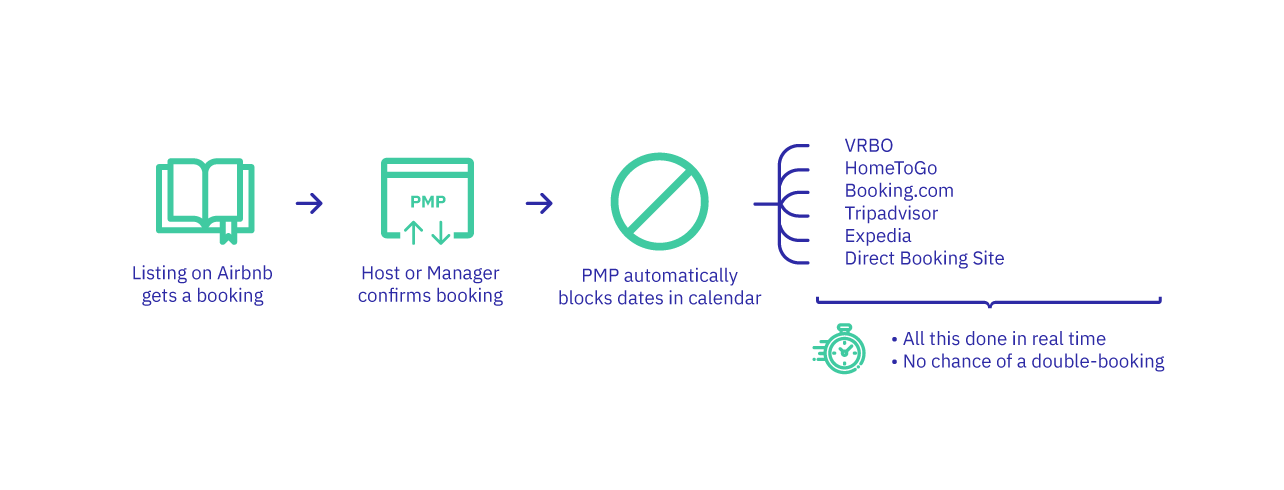
What’s great is that a vacation rental PMP does so much more than handle bookings. On a PMP like ours, your central calendar gives you an overview of all your operations. You can also adjust pricing without logging into different websites, centralize guest communications, and even manage leads to increase the odds of converting an inquiry into a booking. And of course, you can view the metrics of your business without having to crunch the numbers yourself.
The Hostfully PMP also gives you flexibility so that you can customize your platform to the uniqueness of your business. Need software for turnover automation? Just activate the integration, and it’ll streamline cleaning coordination across all your properties. Want to send unique keypad access codes to guests? Integrate the software with Hostfully, and your guests will receive an SMS or email the day of check-in with that code.
You’re now much more independent than ever
With leads coming in from different vacation rental platforms as well as a direct booking site, you’ve ended your over-reliance on one or two giant tech companies. You’re also using technology to automate and streamline your daily operations. That extra time, energy, and booking revenue can now be directed to expansion and acquisitions. Good luck, and don’t forget that we’re here to help along the way.






